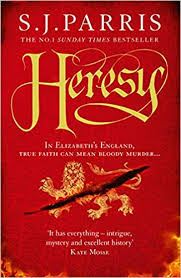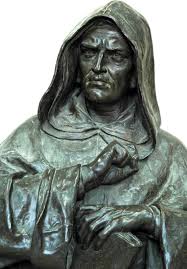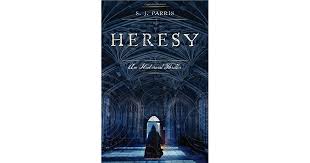Heresy (2010) by S. J. Parris
GoodReads metadata is 435 pages, rated 3.74 by 8858 litizens.
Genre: period krimi.
Verdict: Trying too hard.

Ex-communicate Giordano Bruno of Nola (1548 – 1600) became a peripatetic scholar, staying a few steps ahead of the Inquisition through Italy, Rhineland, Burgundy, Belgium, Nederlands, France, and then England. His travels took him to Oxford in 1583 where he found Lincoln College to be a mares nest of intrigue and backstabbing. So little has changed I shouldn’t wonder. As an enemy of the Pope, he was a welcome visitor to Anglican England, however as a born Catholic he was suspect at the same time.
In seeking refuge in England in these pages, Bruno accepts a commission to work for, that is, spy for Sir Francis Walsingham to ferret out enemies of the realm – Queen Elizabeth I. There are plenty of likely candidates in Oxford. If Bruno will merely keep his eyes open he may discern intelligence of value to Sir Francis. The arrangement suits Bruno for it secures his patronage in England and puts coins in his purse, and all he has to do is observe. Well, he is a scientist at heart, and observing is what he does. All the better to be paid to do so.
That commitment is the thin end of the wedge, and soon enough he is mired in detailed descriptions of gory murder(s) and bloody sacrilege. He is driven by his Holmesian curiosity and lust for the Lincoln dean’s daughter to dig ever deeper into comings and goings. He thwarted every step of the way by one-dimensional characters who are conjured on the page only to harass him and he stumbles under the weight of pages and pages of descriptions of woodwork, chandeliers, stone walls, floor boards, and guttering candles – all to evoke the time and place, and to bore this reader to mechanical pages thumbing on the Kindle.

Bruno did not want the life of a visiting professor, but his efforts to secure a tenured appointment failed each place he went. He was, perhaps, just too controversial to make a fixture. Allowing him to lecture for a few months, while he used the local library, could be branded as a sign of open-mindedness and even toleration, but to sign him up was going too far beyond the pale of conventionality. For he said in his tactless way what he believed: that the Earth orbited the Sun, that the universe was boundless, that Deism did not require an established Church, that…. Well, that is enough to kindle the fires.
A practical skill that made Bruno welcome in some princely courts was memory. He developed mnemonics to stimulate and structure memory, and devised a set of shorthand symbols to teach them. But to Republicans of the day these very symbols conjured the devil, like Arabic numbers today, and made him a devil. Idiocracy is nothing new.
Before MI5 and MI6 began their turf war, there was Walsingham (1532-1590). Wikipedia has a surprisingly informative and dispassionate entry on him right now. Read it before it gets edited again to satisfy a troll’s ego.

This is the first title in a series featuring Bruno. Having started it ages ago, this time I finished it but only thanks to perseverance not pleasure. After compiling a massive amount of research on the time and place, the author crams every last iota of it on the page at the expense of pace, momentum, interest, movement, character, balance, or plot. To liven the dead pages up that result, there are punctuations of fights and flights likewise described in numbing detail which I find even more boring. The result is indigestion as in a fifty-course degustation menu.
Despite the overheated tripe on the Amazon web page I downloaded and read this title out of morbid interest in the setting at Oxford University during the religious war(s) in 1585. Because Bruno was such a fascinating character I might try the second volume in the hope that the writer has gained confidence and no longer needs to force-feed the reader pointless descriptions. But not just yet.

